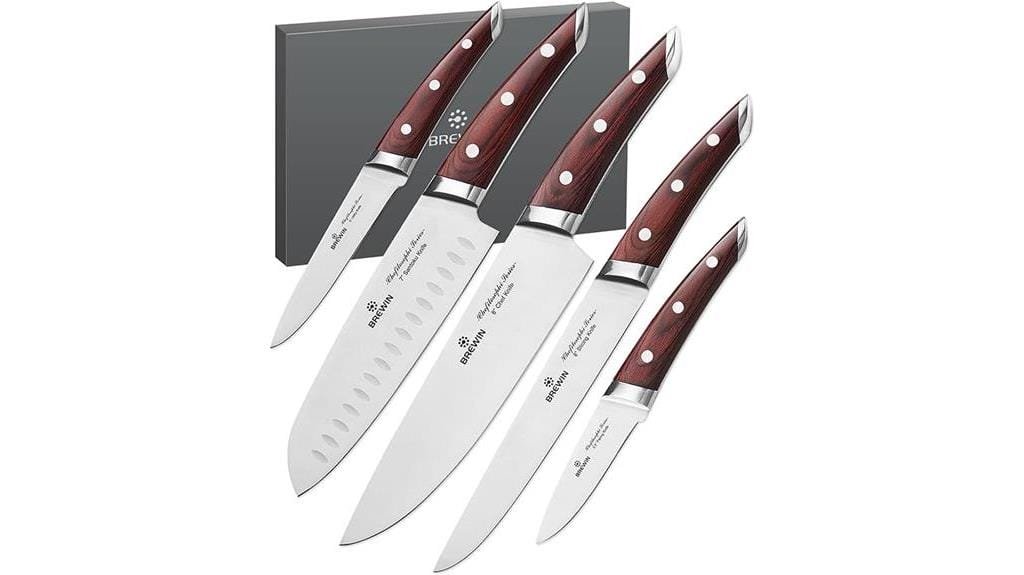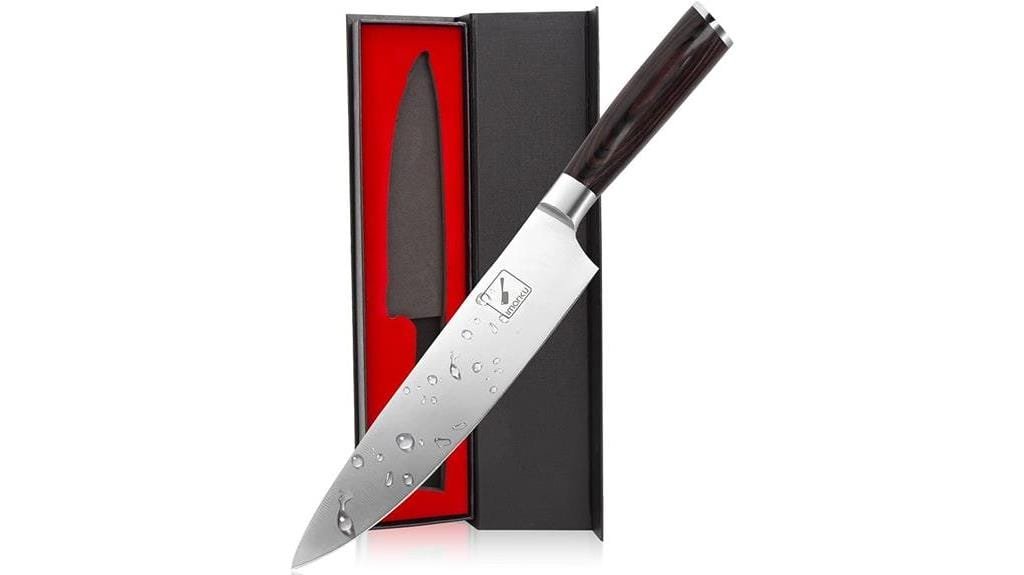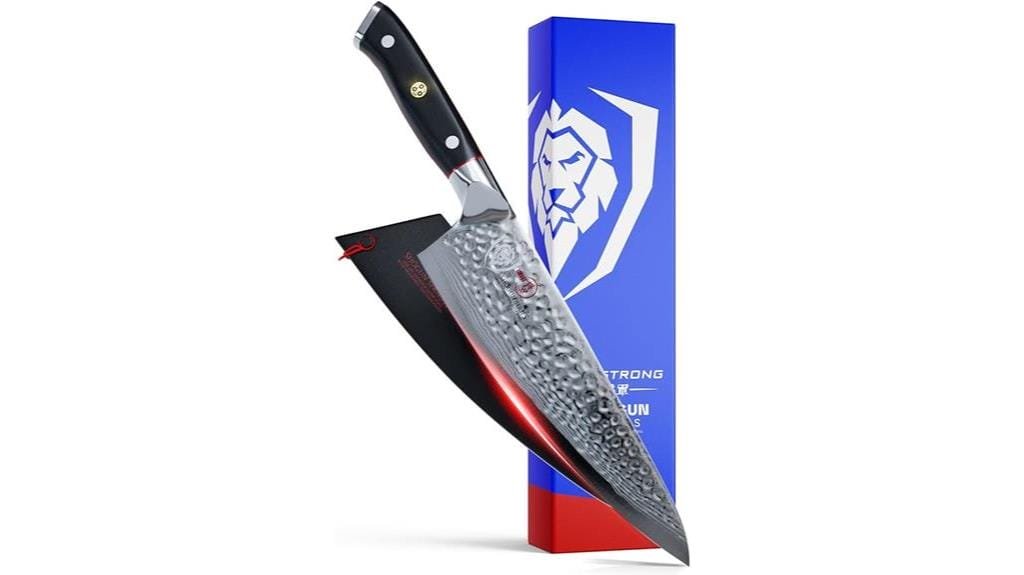As a professional chef, you understand that a high-quality chef knife is vital for culinary mastery. For superior performance, consider the Brewin CHEFILOSOPHI Japanese Chef Knife Set, iMarku Japanese Chef Knife, or Dalstrong Chef Knife – 8 inch Blade – Shogun Series ELITE. Each of these knives boasts exceptional durability, sharpness, and control, crafted from high-carbon stainless steel with ergonomic handles for comfort and stability. Whether you're seeking a versatile set or a precision blade, these knives are sure to refine your cooking experience. As you delve into the world of professional chef knives, uncover what sets these exceptional tools apart and how they can transform your culinary artistry.
Points To Keep In Mind
- Material and durability are top priorities for professional chef knives, with high-carbon stainless steel being ideal.
- High-carbon stainless steel blades with a Rockwell hardness score of 56+ contribute to improved edge retention.
- Ergonomic handle design is crucial for comfort and control during extended use in professional kitchen settings.
- Balanced weight distribution and ideal weight ranges enable control and precision, reducing fatigue and strain.
- Regular sharpening is imperative to maintain a knife's edge, with daily honing and weekly sharpening recommended for peak performance.
Brewin CHEFILOSOPHI Japanese Chef Knife Set

If you're looking for a chef knife set that's both versatile and durable, the Brewin CHEFILOSOPHI Japanese Chef Knife Set is an excellent choice. This set consists of five pieces crafted from high-carbon stainless steel, featuring an elegant red pakkawood handle with an ergonomic design that caters to both professional and home cooks. With two 8-inch knives, a santoku knife, a 5-inch utility knife, and a paring knife, this set provides you with multiple options for tackling different kitchen tasks. Constructed from 1.4116 German stainless steel, these knives achieve a Rockwell hardness score of 56+, ensuring durability and rust resistance.
Best For: Professional and home cooks looking for a versatile, durable, and high-quality Japanese chef knife set.
Pros:
- The Brewin CHEFILOSOPHI Japanese Chef Knife Set is made from high-carbon stainless steel, ensuring durability and rust resistance.
- The set features an ergonomic design and elegant red pakkawood handle, providing comfort and style for cooks.
- With a rating of 4.7 out of 5 stars from over 1,600 users, this set is recognized for its balance, comfort, and sharpness.
Cons:
- Some customers note that the set does not include a serrated knife, which may be a drawback for those who need this type of knife.
- Although the set has a high rating, it may not meet the standards of extremely experienced chefs who require a high level of customization.
- The set may not be suitable for those on a very tight budget, as the price of approximately $90 may still be out of range for some users.
iMarku Japanese Chef Knife

The iMarku Japanese Chef Knife stands out as a top choice for home cooks and professional chefs alike, particularly those who value durability and versatility. This multi-functional gyutou knife boasts an 8-inch high-carbon stainless steel blade, which boasts a 0.6-0.75% carbon content and 16-18% chrome, resulting in a hardiness of 56-58 HRC. This superior construction guarantees the knife remains sharp and resistant to corrosion, even with frequent use. You'll appreciate the ergonomic Pakka handle, designed for comfort and stability, allowing you to maneuver through different cooking tasks with ease. Whether you're slicing vegetables, dicing meat, or chopping through bones, this knife is sure to become your go-to companion in the kitchen.
Best For: Home cooks and professional chefs looking for a durable, versatile, and high-quality chef knife.
Pros:
- Offers superior durability and resistance to corrosion due to its high-carbon stainless steel blade and 56-58 HRC hardiness.
- Features an ergonomic Pakka handle designed for comfort, strength, and stability, making it suitable for various cooking tasks.
- Boasts a multi-functional design, ideal for slicing, dicing, chopping, and cutting meat off bones.
Cons:
- Some customers reported a slight bend where the blade meets the handle.
- The knife's weight and balance might take some time to get used to, despite being relatively lightweight.
- Although dishwasher safe, the manufacturer does not provide specific dishwasher settings, which might affect the knife's longevity.
Dalstrong Chef Knife – 8 inch Blade – Shogun Series ELITE

Dalstrong's Chef Knife – 8 inch Blade – Shogun Series ELITE, stands out as a top choice for professional chefs and home cooks seeking exceptional sharpness and durability. Its 8-inch Damascus blade is crafted from 67 layers of high-carbon stainless steel, featuring AUS-10V Japanese super steel with a 62+ Rockwell hardness. This results in an ultra-sharp blade that's nitrogen cooled for fortified hardness, flexibility, and corrosion resistance. The military-grade G10 handle with ergonomic design provides comfort and control, while the hand-polished blade spine guarantees smooth handling. With its ruthlessly sharp edge and excellent balance, this knife is comparable in quality to Shun and Wusthoff forged blades.
Best For: Professional chefs and home cooks seeking exceptional sharpness and durability in a high-quality chef's knife.
Pros:
- Offers an ultra-sharp blade with excellent edge retention and corrosion resistance
- Provides comfort and control with its military-grade G10 handle and ergonomic design
- Comparable in quality to high-end brands like Shun and Wusthoff forged blades
Cons:
- Some customers mention minor issues with the handle or blade
- No specific information on the lifetime of the warranty
- May require more maintenance to keep the blade sharp and the handle in good condition
Factors to Consider When Choosing Chef Knives for Professional
As you prepare to invest in a professional chef knife, guaranteeing the factors that will maximize its peak performance and longevity is crucial, from the material and construction that will withstand the rigors of heavy use to the subtle nuances of balance and weight. You'll also want to ponder the ergonomic design of the handle and how it fits comfortably in your hand, allowing you to chop, slice, and dice with precision and control. By carefully weighing these key considerations, you can select the perfect chef knife to boost your culinary skills and meet the demands of a fast-paced professional kitchen.
Material and Durability
When you're investing in a professional chef knife, material and durability are top priorities. To guarantee a long-lasting performance, look for stainless steel with a high carbon content, typically between 0.6-0.75%, which strengthens hardness and durability. A Rockwell hardness score of 56+ is a common benchmark for high-quality chef knives, indicating excellent edge retention and resistance to corrosion. You'll also want to opt for forged construction over stamped construction, as it provides added strength and durability.
A full tang design, where the metal blade extends through the handle, offers added stability and balance to the knife. Furthermore, corrosion resistance is critical in chef knives, and a glossy finish can help prevent tarnish and prolong longevity. By considering these factors, you'll be able to find a chef knife that meets your needs and withstands the demands of a professional kitchen. A durable and well-constructed knife will provide you with years of reliable service, making it a vital investment for any serious chef. By prioritizing material and durability, you'll be able to focus on perfecting your craft, rather than worrying about your tools.
Blade Edge Retention
Most professional chefs will tell you that a knife's ability to hold its edge is just as pivotal as its total resilience. In selecting a chef knife, you'll want to ponder the blade's edge retention capabilities. A key factor to ponder is the Rockwell hardness score, which directly influences edge retention. Look for high-carbon stainless steel blades with a score of 56+ for peak retention. Furthermore, a high-carbon content of 0.6-0.75% can contribute to improved edge retention. The sharpening method used also plays a pivotal role, with traditional methods like the 3-step Honbazuke method resulting in a sharper, longer-lasting edge. Nitrogen cooling during manufacturing can further fortify edge retention by increasing the blade's hardness and flexibility. To optimize edge retention, maintaining and regularly sharpening your blade is imperative. A well-maintained blade can retain its edge for longer periods, making maintenance a pivotal factor in edge retention. By pondering these factors, you can choose a chef knife that will consistently deliver sharp, precise cuts.
Ergonomic Handle Design
Choosing the right chef knife involves considering more than just the blade – a well-designed ergonomic handle is crucial for professional chefs. An ergonomic handle design should prioritize comfort, strength, and stability, allowing for reduced fatigue and improved control during prolonged kitchen tasks. When selecting a chef knife, look for a contoured handle shape that fits snugly in your palm, with a subtle curvature to support the natural arc of your hand and wrist.
Materials such as Pakka or G10 are often preferred for their durability, moisture resistance, and non-slip grip, even in wet or oily conditions. These features are indispensable for professional chefs who need to maintain control and precision while working in demanding kitchen environments. A well-designed ergonomic handle should also accommodate a range of grip styles and hand sizes, allowing you to work efficiently and safely without compromising your technique. By choosing a chef knife with a thoughtfully designed ergonomic handle, you can guarantee a comfortable and precise cutting experience.
Balance and Weight
A well-designed ergonomic handle is just one aspect of a chef knife that contributes to a comfortable and precise cutting experience. However, it's just as crucial to ponder the balance and weight of the knife, as these factors substantially influence its general performance. In terms of balance, you're looking for a knife with a weight distribution of 50-70% towards the blade and 30-50% towards the handle. This allows for smooth and controlled movements, enabling you to make precise cuts with ease.
The ideal weight of a chef knife depends on your personal preference, but generally ranges from 6-12 ounces. Lighter knives are suitable for delicate work, while heavier knives are better suited for heavy-duty chopping. A knife with a balanced weight distribution enables you to maintain control and precision, reducing fatigue and strain during extended use. Ergonomic handles designed for comfort and support also impact the general balance and weight of a knife, making it more comfortable to hold and maneuver. By pondering the balance and weight of a chef knife, you'll be able to choose a knife that complements your cooking style and boosts your general performance in the kitchen.
Ease of Sharpening
Sharpening a chef knife is a pivotal step in maintaining its performance, and selecting a knife that's easy to sharpen can save you time and frustration in the long run. When choosing a chef knife, key to examine is the material, as high-carbon stainless steel and Japanese super steel are more receptive to sharpening than other materials. A knife's Rockwell hardness score is also paramount, with a score between 56-62 striking a balance between hardness and flexibility, making it easier to sharpen.
The edge angle of the knife also plays a role in sharpening ease, with a narrower angle requiring more frequent sharpening but resulting in a sharper blade. Regular sharpening is imperative to maintain a knife's edge, with daily honing and weekly sharpening recommended for peak performance. Furthermore, a comfortable, ergonomic handle can reduce fatigue and improve control during the sharpening process. By weighing these factors, you can choose a chef knife that's easy to sharpen, saving you time and ensuring your knife remains in top condition. With the right knife, you'll be able to focus on cooking, rather than struggling with sharpening.
Frequently Asked Questions
Can I Sharpen Chef Knives at Home?
You can sharpen chef knives at home with the right tools and techniques. Invest in a whetstone or electric sharpener, and practice your skills to achieve a razor-sharp edge that rivals professional results every time.
What Steel Is Best for Chef Knives?
When choosing a chef knife, you'll find multiple steel options. You're likely looking for a balance of durability, sharpness, and resistance to corrosion. High-carbon stainless steel, like VG-10 or SG2, is a popular choice for its strength and versatility.
Are Ceramic Knives Suitable for Professionals?
You might wonder if ceramic knives suit your professional needs. They offer excellent edge retention and corrosion resistance. However, their brittleness and lack of flexibility can limit their use in high-pressure, fast-paced commercial kitchens for you.
Should I Store Chef Knives in a Block?
You're deciding how to store your knives, and a block is a popular choice. Storing chef knives in a block keeps them organized, within reach, and protects them from damage, but consider a dry environment to prevent rust.
Can I Use a Chef Knife for Carving Meat?
You can use a chef knife for carving meat, but it's not ideal. Chef knives are versatile, but they're better suited for chopping and mincing. Carving knives are specifically designed for smooth, even cuts in meat.
Bringing It All Together
By selecting from premium options like the Brewin CHEFILOSOPHI Japanese Chef Knife Set, iMarku Japanese Chef Knife, or Dalstrong Chef Knife – 8 inch Blade – Shogun Series ELITE, you'll enhance your culinary skills. When choosing a chef knife, remember to ponder factors like blade material, edge retention, and ergonomic design. These elements, combined with the right fit and feel, will guarantee superior performance and help you master the art of cooking with precision and finesse.